Andy Ray’s Ten Best Films of 2018
2018 was quite a year for Hollywood. We were treated to not one, but two films about the ravages of hard drug abuse – “Beautiful Boy” and “Ben is Back” – two films about gay conversion therapy – “The Miseducation of Cameron Post” and “Boy Erased” – and two films about U.S. Supreme Court justice and civil rights pioneer Ruth Bader Ginsberg – “RBG” and the forthcoming “On the Basis of Sex.” While the overall output was not as strong as that of 2017, I was able to find ten pictures that rose above the rest. These are my picks for the best of 2018:
Tully
 In Jason Reitman’s “Tully,” Charlize Theron turns in a marvelous performance as Marlo, a mother of two elementary kids and a newborn. Her husband is a good man, always ready and willing to help with homework; but his career forces him to travel more than Marlo would like. So she hires a nighttime nanny named Tully – who turns out to be a gem. She instantly bonds with the baby and the other family members. When Marlo and Tully leave the kids with Dad one night to drive into the city and barhop, I thought I knew where this picture was headed. I was pleasantly surprised that screenwriter Diablo Cody took “Tully” in a completely different direction. This film turned out to be a lot deeper than I had expected, and I wish it had been released late in the year for the benefit of Oscar voters.
In Jason Reitman’s “Tully,” Charlize Theron turns in a marvelous performance as Marlo, a mother of two elementary kids and a newborn. Her husband is a good man, always ready and willing to help with homework; but his career forces him to travel more than Marlo would like. So she hires a nighttime nanny named Tully – who turns out to be a gem. She instantly bonds with the baby and the other family members. When Marlo and Tully leave the kids with Dad one night to drive into the city and barhop, I thought I knew where this picture was headed. I was pleasantly surprised that screenwriter Diablo Cody took “Tully” in a completely different direction. This film turned out to be a lot deeper than I had expected, and I wish it had been released late in the year for the benefit of Oscar voters.
If Beale Street Could Talk
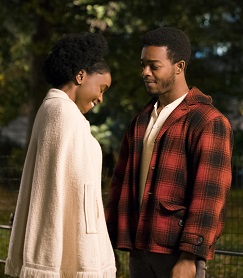 Barry Jenkins’ “Moonlight” won the Best Picture Oscar for 2016. But I prefer his 2018 offering, a big screen adaptation of James Baldwin’s 1974 novel, “If Beale Street Could Talk.” Tish and Fonny (KiKi Layne and Stephan James) are young lovers expecting their first child. Only one problem: Fonny is imprisoned for a crime which he did not commit. The dynamic amongst the young couple’s family members is brilliant, and the social criticism of the plight of African-American men in the early ‘70s is still pertinent today. Still, “If Beale Street Could Talk” is a love story at heart – and a sometimes excruciating one at that, given Fonny’s predicament. This film opens Friday.
Barry Jenkins’ “Moonlight” won the Best Picture Oscar for 2016. But I prefer his 2018 offering, a big screen adaptation of James Baldwin’s 1974 novel, “If Beale Street Could Talk.” Tish and Fonny (KiKi Layne and Stephan James) are young lovers expecting their first child. Only one problem: Fonny is imprisoned for a crime which he did not commit. The dynamic amongst the young couple’s family members is brilliant, and the social criticism of the plight of African-American men in the early ‘70s is still pertinent today. Still, “If Beale Street Could Talk” is a love story at heart – and a sometimes excruciating one at that, given Fonny’s predicament. This film opens Friday.
The Ballad of Buster Scruggs
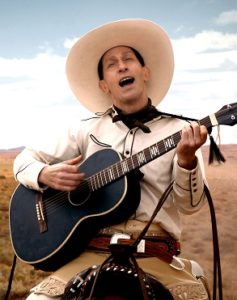 The Coen Brothers churned out their best picture in years with the American Western anthology “The Ballad of Buster Scruggs.” Six stories are told – some funny, some riveting, some sad. Only one of them goes on so long it wears out its welcome. While Tom Waits is perfectly cast as a gold prospector in a solo turn about halfway through, my favorite vignettes were the first and the last. The first features Tim Blake Nelson as a singing cowboy who chastises and picks fights with various townsfolk, only to prove he’s the best shot in the West. In the final sequence, five travelers share a stagecoach ride – and some enticing conversation – en route to a distant hotel. Tyne Daly shines as a forthright religious woman put off by the bad breath of the surprisingly literate fur trapper sitting next to her (Chelcie Ross). “Buster Scruggs” proves the Coens still excel with the American Western. They parody the genre while always paying it homage.
The Coen Brothers churned out their best picture in years with the American Western anthology “The Ballad of Buster Scruggs.” Six stories are told – some funny, some riveting, some sad. Only one of them goes on so long it wears out its welcome. While Tom Waits is perfectly cast as a gold prospector in a solo turn about halfway through, my favorite vignettes were the first and the last. The first features Tim Blake Nelson as a singing cowboy who chastises and picks fights with various townsfolk, only to prove he’s the best shot in the West. In the final sequence, five travelers share a stagecoach ride – and some enticing conversation – en route to a distant hotel. Tyne Daly shines as a forthright religious woman put off by the bad breath of the surprisingly literate fur trapper sitting next to her (Chelcie Ross). “Buster Scruggs” proves the Coens still excel with the American Western. They parody the genre while always paying it homage.
BlacKkKlansman
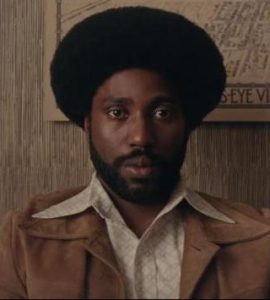 Spike Lee gave us his best product in a quarter century with “BlacKkKlansman,” the true story of an African-American police officer who infiltrated the local KKK back in 1972. Played by John David Washington (Denzel’s son), Ron Stallworth is adept enough to get himself invited to a meeting, but then must obviously be substituted by one of the white cops on the force. The stand-in is played by Adam Driver, and he happens to be Jewish – another target of the Klan. The story itself is interesting, but Lee excels when he ties the 1972 story to the Charlottesville riot of 2017 – complete with footage of President Trump praising both sides. Like Steven Spielberg’s 2017 offering “The Post,” “BlacKkKlansman” doesn’t hide from the obvious comparison of the Trump administration with that of Richard Nixon.
Spike Lee gave us his best product in a quarter century with “BlacKkKlansman,” the true story of an African-American police officer who infiltrated the local KKK back in 1972. Played by John David Washington (Denzel’s son), Ron Stallworth is adept enough to get himself invited to a meeting, but then must obviously be substituted by one of the white cops on the force. The stand-in is played by Adam Driver, and he happens to be Jewish – another target of the Klan. The story itself is interesting, but Lee excels when he ties the 1972 story to the Charlottesville riot of 2017 – complete with footage of President Trump praising both sides. Like Steven Spielberg’s 2017 offering “The Post,” “BlacKkKlansman” doesn’t hide from the obvious comparison of the Trump administration with that of Richard Nixon.
Green Book
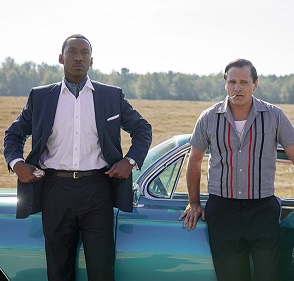 In the year’s best mainstream picture, Viggo Mortensen turns in the best performance of his career as a workaday Italian-American tough guy from the Bronx who accepts a two-month job driving pianist Doc Shirley (Mahershala Ali) on a tour of the Deep South in 1962. Peter Farrelly’s “Green Book” has been described as “Driving Miss Daisy” in reverse, as the white guy drives the black guy this time. But “Green Book” is so much more. Once the premise has been established, it’s pretty clear both men will learn something about the other, and consequently soften their feelings about the other’s race. This film is predictable, but the screenplay is filled with memorable moments and clever dialogue. This is the type of film I can see winning this year’s Best Picture Oscar. It’s that good.
In the year’s best mainstream picture, Viggo Mortensen turns in the best performance of his career as a workaday Italian-American tough guy from the Bronx who accepts a two-month job driving pianist Doc Shirley (Mahershala Ali) on a tour of the Deep South in 1962. Peter Farrelly’s “Green Book” has been described as “Driving Miss Daisy” in reverse, as the white guy drives the black guy this time. But “Green Book” is so much more. Once the premise has been established, it’s pretty clear both men will learn something about the other, and consequently soften their feelings about the other’s race. This film is predictable, but the screenplay is filled with memorable moments and clever dialogue. This is the type of film I can see winning this year’s Best Picture Oscar. It’s that good.
A Star is Born
 Not since Judy Garland’s 1954 offering has there been as strong a version of “A Star is Born” as Bradley Cooper’s 2018 film. Playing aging rocker Jackson Maine himself, Cooper shines as both actor and director; and pop star Lady GaGa is mesmerizing as Ally, the young up-and-coming star Maine discovers one night in a gay nightclub. Lady GaGa is best during the early scenes when she displays the vulnerability the role requires – and that Barbra Streisand did not display in her full-diva performance in 1976. I loved everything about this version, although I fear Sam Elliott may win Best Supporting Actor for his turn as Maine’s brother, in which he essentially plays himself.
Not since Judy Garland’s 1954 offering has there been as strong a version of “A Star is Born” as Bradley Cooper’s 2018 film. Playing aging rocker Jackson Maine himself, Cooper shines as both actor and director; and pop star Lady GaGa is mesmerizing as Ally, the young up-and-coming star Maine discovers one night in a gay nightclub. Lady GaGa is best during the early scenes when she displays the vulnerability the role requires – and that Barbra Streisand did not display in her full-diva performance in 1976. I loved everything about this version, although I fear Sam Elliott may win Best Supporting Actor for his turn as Maine’s brother, in which he essentially plays himself.
Roma
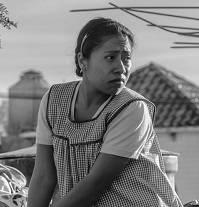 Alfonso Cuaron gave us his most personal film, and the best foreign language film I’ve seen in over 20 years, with “Roma,” the story of Cleo, a live-in domestic for a well-off doctor’s family in 1971 Mexico City. Shot in beautiful black-and-white, “Roma” is a simple story set against the backdrop of social unrest and political upheaval. There’s a lot going on here, and Cuaron captures it brilliantly by shooting almost the entire picture with a wide-angle lens. When Cleo sits down to cry in the city market, Cuaron shows us the mariachi dancers and excited shoppers surrounding Cleo as she buries her head in her hands. It’s a poignant moment in a film filled with poignant moments. Again, I loved everything about “Roma.” If given the chance to edit this one, I wouldn’t change a thing.
Alfonso Cuaron gave us his most personal film, and the best foreign language film I’ve seen in over 20 years, with “Roma,” the story of Cleo, a live-in domestic for a well-off doctor’s family in 1971 Mexico City. Shot in beautiful black-and-white, “Roma” is a simple story set against the backdrop of social unrest and political upheaval. There’s a lot going on here, and Cuaron captures it brilliantly by shooting almost the entire picture with a wide-angle lens. When Cleo sits down to cry in the city market, Cuaron shows us the mariachi dancers and excited shoppers surrounding Cleo as she buries her head in her hands. It’s a poignant moment in a film filled with poignant moments. Again, I loved everything about “Roma.” If given the chance to edit this one, I wouldn’t change a thing.
The Hate U Give
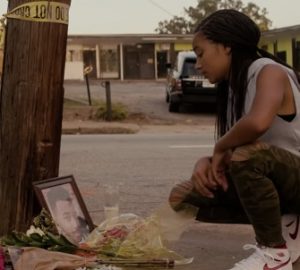 In a year chock full of outstanding portraits of the African-American experience, none was superior to George Tillman Jr.’s “The Hate U Give” – the story of Starr (Amandla Stenberg, in one of the year’s best performances by anyone in any film), a black girl attending a private mostly-white charter school. When Starr’s lifelong friend Khalil (Algee Smith) is gunned down by a white cop during a routine traffic stop, she refuses to tell her classmates – even her white boyfriend, by all accounts a fine, upstanding young man – lest they not understand her plight. Starr’s father (Russell Hornsby) is a former gang member doing his best to raise a family without any controversy – until the media latch onto Starr as the person riding in Khalil’s car the night he was killed. There’s a lot going on in Audrey Wells’ adapted screenplay. “The Hate U Give” is richly layered, and very hard-hitting. This is the kind of film Spike Lee would have made in his younger days.
In a year chock full of outstanding portraits of the African-American experience, none was superior to George Tillman Jr.’s “The Hate U Give” – the story of Starr (Amandla Stenberg, in one of the year’s best performances by anyone in any film), a black girl attending a private mostly-white charter school. When Starr’s lifelong friend Khalil (Algee Smith) is gunned down by a white cop during a routine traffic stop, she refuses to tell her classmates – even her white boyfriend, by all accounts a fine, upstanding young man – lest they not understand her plight. Starr’s father (Russell Hornsby) is a former gang member doing his best to raise a family without any controversy – until the media latch onto Starr as the person riding in Khalil’s car the night he was killed. There’s a lot going on in Audrey Wells’ adapted screenplay. “The Hate U Give” is richly layered, and very hard-hitting. This is the kind of film Spike Lee would have made in his younger days.
Eighth Grade
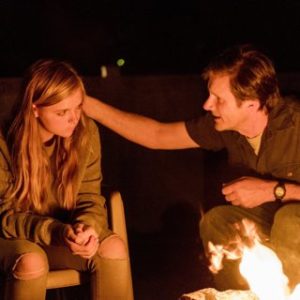 I’ve never seen a more accurate depiction of teenage life than in comedian Bo Burnham’s “Eighth Grade.” So realistic I hardly realized she was acting, voice actress Elsie Fisher turns in another of the year’s best performances as Kayla – not so much an unpopular girl as an invisible one. Nobody notices Kayla, and unlike every other teen protagonist in the movies, has no best friend. Kayla’s greatest concern is whether or not to attend the popular girl’s pool party one summer. On the one hand, if she stays home she remains essentially invisible; on the other, if she attends she opens up herself for potential ridicule. This isn’t “Fast Times at Ridgemont High.” These teenagers are actually played by teens, and their dialogue and innermost feeling so reflect those of teens that I wasn’t surprised when “Eighth Grade” built more of a following among adults than with teens themselves. In one of the year’s best supporting performances, Josh Hamilton plays Kayla’s dad – always with a dumb joke or pun to try to break Kayla into at least a smile, but much more astute and caring than almost any other parent in any other coming-of-age film in recent memory.
I’ve never seen a more accurate depiction of teenage life than in comedian Bo Burnham’s “Eighth Grade.” So realistic I hardly realized she was acting, voice actress Elsie Fisher turns in another of the year’s best performances as Kayla – not so much an unpopular girl as an invisible one. Nobody notices Kayla, and unlike every other teen protagonist in the movies, has no best friend. Kayla’s greatest concern is whether or not to attend the popular girl’s pool party one summer. On the one hand, if she stays home she remains essentially invisible; on the other, if she attends she opens up herself for potential ridicule. This isn’t “Fast Times at Ridgemont High.” These teenagers are actually played by teens, and their dialogue and innermost feeling so reflect those of teens that I wasn’t surprised when “Eighth Grade” built more of a following among adults than with teens themselves. In one of the year’s best supporting performances, Josh Hamilton plays Kayla’s dad – always with a dumb joke or pun to try to break Kayla into at least a smile, but much more astute and caring than almost any other parent in any other coming-of-age film in recent memory.
The Long Dumb Road
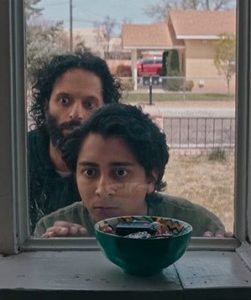 Written and directed by Indiana University film school graduate Hannah Fidell, “The Long Dumb Road” hasn’t opened yet, and as of this writing, I have no opening date. Still, I found this “Not another road trip movie!” to be the year’s best picture, and one of my favorites of this decade. Tony Revolori (the young apprentice from “The Grand Budapest Hotel”) plays Nat – an upper-middle class student driving from his parents’ home in the East Texas suburbs to Los Angeles to begin film school. When the car breaks down in the middle of nowhere, a good-for-nothing drifter named Richard (Jason Mantzoukas) offers to repair it in exchange for a ride to Las Vegas. Their ensuring journey features a series of vignettes which take them to visit Richard’s high school sweetheart in New Mexico, a pickup truck ride with a boisterous local played by the great Pamela Reed, and a chance meetup with a couple girls – one of whom Richard asks to marry him. But unlike most road movies, “The Long Dumb Road” is not plot driven; each story is a little play within a play. And Fidell smartly lets each thread play itself out before moving onto the next. She lets Revolori and Mantzoukas act without forcing unnecessary plot twists on their characters. And her original screenplay features some of the wittiest and most original dialogue I’ve seen in a long time. “The Long Dumb Road” is one of the most delightful cinematic journeys of the decade, and I hope it receives the recognition it deserves.
Written and directed by Indiana University film school graduate Hannah Fidell, “The Long Dumb Road” hasn’t opened yet, and as of this writing, I have no opening date. Still, I found this “Not another road trip movie!” to be the year’s best picture, and one of my favorites of this decade. Tony Revolori (the young apprentice from “The Grand Budapest Hotel”) plays Nat – an upper-middle class student driving from his parents’ home in the East Texas suburbs to Los Angeles to begin film school. When the car breaks down in the middle of nowhere, a good-for-nothing drifter named Richard (Jason Mantzoukas) offers to repair it in exchange for a ride to Las Vegas. Their ensuring journey features a series of vignettes which take them to visit Richard’s high school sweetheart in New Mexico, a pickup truck ride with a boisterous local played by the great Pamela Reed, and a chance meetup with a couple girls – one of whom Richard asks to marry him. But unlike most road movies, “The Long Dumb Road” is not plot driven; each story is a little play within a play. And Fidell smartly lets each thread play itself out before moving onto the next. She lets Revolori and Mantzoukas act without forcing unnecessary plot twists on their characters. And her original screenplay features some of the wittiest and most original dialogue I’ve seen in a long time. “The Long Dumb Road” is one of the most delightful cinematic journeys of the decade, and I hope it receives the recognition it deserves.